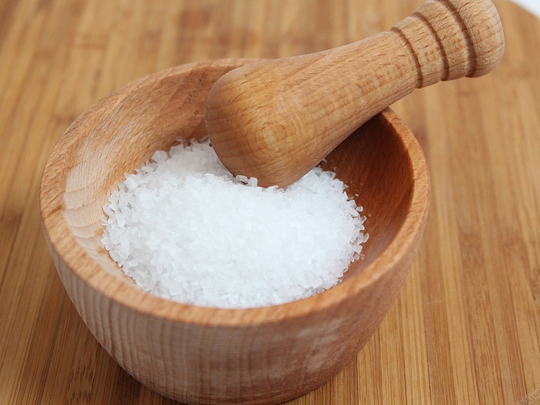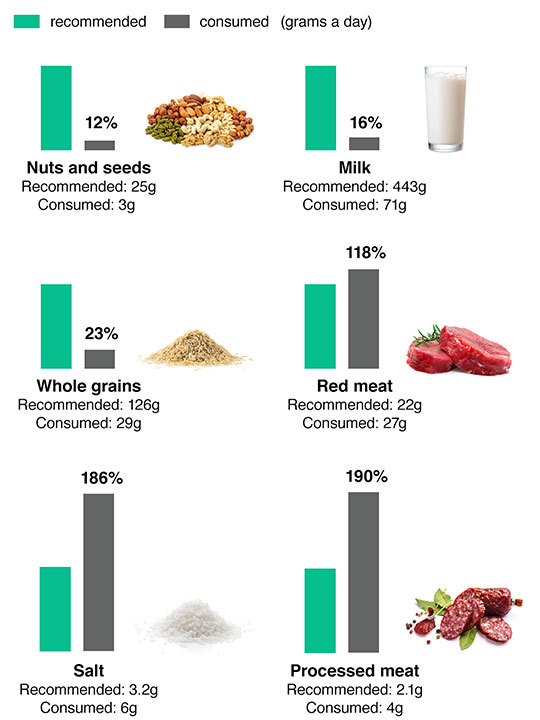
Mom is right when she tells you to eat your peas.
In one of the largest surveys of data on global dietary habits and longevity, researchers found that consuming vegetables, fruits, fish and whole grains was strongly associated with a longer life - and that people who skimped on such healthy foods were more likely to die before their time.

The study, published Wednesday in the British journal The Lancet, concluded that one-fifth of deaths around the world were associated with poor diets.
Too few whole grains,seeds and nuts
Too little fruit and vegetables
Eleven million deaths worldwide in 2017 were from diseases that are linked to making poor dietary choices;
- Cardiovascular disease - 10 million deaths
- Cancer - 913,000 deaths
- Type 2 diabetes - 339,000 deaths
How is salt killing us?
Too much salt raises blood pressure and that in turn raises the risk of heart attacks and strokes. Salt can also have a direct effect on the heart and blood vessels, leading to heart failure when the organ does not work effectively.

Whole grains, fruit and vegetables have the opposite effect - they are "cardioprotective" and lower the risk of heart problems.
The study found people ate only 12 percent of the recommended amount of nuts and seeds - an average intake of 3 grams a day, compared to the recommended 21 g - and drank more than 10 times the recommended amount of sugary drinks.

Diets high in sugar, salt and bad fats are known risk factors for heart disease, stroke, diabetes and many types of cancer.
The global diet also included less than a quarter of the recommended amount of whole grains - at 29 g average intake a day compared with the recommended 125 g - and almost double the recommended amount of processed meat - at around 4 g average intake per day compared with the 2 g recommended.
A wake-up call
"These numbers are really striking," said Dr. Francesco Branca, the top nutritionist at the World Health Organization, who was not involved in the study. "This should be a wake-up call for the world."
The study, which was funded by the Bill & Melinda Gates Foundation, covered global eating habits from 1990 to 2017 and tracked consumption in 15 categories - including milk, processed meat, seafood, sodium and fiber.
Researchers analysed data from 195 countries and found the following:
Locations of highest proportion of diet-related deaths
- Papua New Guinea
- Afghanistan
- Marshall Islands
While France, Spain and Peru had some of the lowest rates, the United States ranked 43rd. China was among the worst at 140.
The study found a tenfold difference between countries with the highest and lowest rates of diet-related deaths. For example, Uzbekistan had 892 deaths per 100,000 people compared with 89 in Occupied Palestine.

Solution
Beyond its sobering conclusions, the study was notable for what it prescribed. Rather than browbeating people to reduce their consumption of the fats and sugars that are correlated with illness and premature death, the authors determined that adding healthier foods to global diets was a more effective way to reduce mortality.
This study says that it's time to change the conversation both at the policy level and among the general public
That's because the gap between the amount of nourishing foods people should eat but don't is much greater than that between the levels of harmful things they regularly put in their mouths but shouldn't, said Dr. Ashkan Afshin, an epidemiologist at the University of Washington who was the paper's lead author.
For example, he noted that global average intake of red meat was 27 grams a day, slightly higher than the recommended daily limit of 23 grams. But when it comes to eating healthful nuts and seeds, most people eat on average 3 grams, far less than the 21 grams considered optimal.
The only exception was excess salt, which the research said was highly correlated with illness and death.
"To me, this study says that it's time to change the conversation both at the policy level and among the general public," Afshin said.
He and other experts said the findings underlined the importance of national policies to:
- Boost the availability of fruits and vegetables in low income countries
- Large food companies should be pressured to create healthier products
- Doctors should discuss the importance of a good diet with their patients
"Let's not just focus on the things we should be cutting out of our diet because to be honest, we've tried that for a while," said Dr. Nita Gandhi Forouhi, an epidemiologist at University of Cambridge School of Clinical Medicine who wrote a commentary that accompanied study.
The study had some limitations.
There were notable gaps in diet-related data from poorer nations and some of the deaths, the authors noted, could have been attributed to more than one dietary factor, leading to an overestimation of the burden of diseases attributable to diet.
Still, nutrition and health experts who read the report said its key findings were irrefutable. "This further builds the evidence base around the fact that diet is killing us," said Corinna Hawkes, director of the Center for Food Policy at City, University of London.
Forouhi, the Cambridge epidemiologist, said she hoped that at the very least, the national ranking of diet-related mortality would jolt some countries into action, especially those without national dietary surveys. "Perhaps by naming and shaming, some of the countries at the bottom of the list will be inspired to do better," she said. "At the very least, they can learn from countries near the top."











